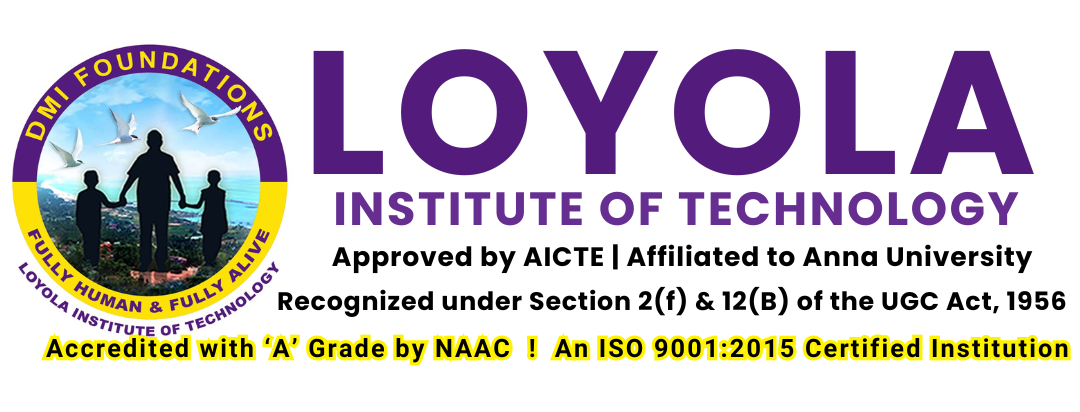B.Tech - Information Technology
Vision
To provide education of global standards in the field of Information Technology that facilitates our students to be competent engineers and bring about emancipation in society through knowledge and wisdom.
Mission
We at the department of Information Technology will strive to:
- Enhance students knowledge in the latest technologies that enables our students to excel in technical education
- Prepare students to solve challenging real world problems through strong research and development.
- Offer high-quality undergraduate program in order to prepare our graduates to become entrepreneurs in their profession.
- Provide an environment that enables our students to be ethically strong to serve the society.
Faculties
Program Educational Objectives (PEOs)
- PEO1: To ensure graduates will be proficient in utilizing the fundamental knowledge of basic sciences, mathematics and Information Technology for the applications relevant to various streams of Engineering and Technology.
- PEO2: To enrich graduates with the core competencies necessary for applying knowledge of computers and telecommunications equipment to store, retrieve, transmit, manipulate and analyze data in the context of business enterprise.
- PEO3: To enable graduates to think logically, pursue lifelong learning and will have the capacity to understand technical issues related to computing systems and to design optimal solutions.
- PEO4: To enable graduates to develop hardware and software systems by understanding the importance of social, business and environmental needs in the human context.
- PEO5: To enable graduates to gain employment in organizations and establish themselves as professionals by applying their technical skills to solve real world problems and meet the diversified needs of industry, academia and research.
Program Specific Outcomes (PSOs)
- PSO1: To create, select, and apply appropriate techniques, resources, modern engineering and IT tools including prediction and modeling to complex engineering activities with an understanding of the limitations.
- PSO2: To manage complex IT projects with consideration of the human, financial, ethical and environmental factors and an understanding of risk management processes, and operational and policy implications.
PSO3: To enable graduates to gain employment in organizations and establish themselves as professionals by applying their technical skills to solve real world problems and meet the diversified needs of industry, academia and research.
Program Outcomes (POs)
Engineering Graduates will be able to:
PO1: Engineering knowledge: Apply the knowledge of mathematics, science, engineering fundamentals, and an engineering specialization to the solution of complex engineering problems.
PO2: Problem analysis: Identify, formulate, review research literature, and analyze complex engineering problems reaching substantiated conclusions using first principles of mathematics, natural sciences, and engineering sciences.
PO3: Design/development of solutions: Design solutions for complex engineering problems and design system components or processes that meet the specified needs with appropriate consideration for the public health and safety, and the cultural, societal, and environmental considerations.
PO4: Conduct investigations of complex problems: Use research-based knowledge and research methods including design of experiments, analysis and interpretation of data, and synthesis of the information to provide valid conclusions.
PO5: Modern tool usage: Create, select, and apply appropriate techniques, resources, and modern engineering and IT tools including prediction and modeling to complex engineering activities with an understanding of the limitations.
PO6: The engineer and society: Apply reasoning informed by the contextual knowledge to assess societal, health, safety, legal and cultural issues and the consequent responsibilities relevant to the professional engineering practice.
PO7: Environment and sustainability: Understand the impact of the professional engineering solutions in societal and environmental contexts, and demonstrate the knowledge of, and need for sustainable development.
PO8: Ethics: Apply ethical principles and commit to professional ethics and responsibilities and norms of the engineering practice.
PO9: Individual and team work: Function effectively as an individual, and as a member or leader in diverse teams, and in multidisciplinary settings.
PO10: Communication: Communicate effectively on complex engineering activities with the engineering community and with society at large, such as, being able to comprehend and write effective reports and design documentation, make effective presentations, and give and receive clear instructions.
PO11: Project management and finance: Demonstrate knowledge and understanding of the engineering and management principles and apply these to one’s own work, as a member and leader in a team, to manage projects and in multidisciplinary environments.
PO12: Life-long learning: Recognize the need for, and have the preparation and ability to engage in independent and life-long learning in the broadest context of technological change
Course Outcomes (COs)
- Regulation 2017 – Click Here to View
- Regulation 2021 – Click Here to View
Syllabus
- Regulation 2013 – Click Here to View
- Regulation 2017 – Click Here to View
- Regulation 2021 – Click Here to View
Study Materials
- Click Here to Download


